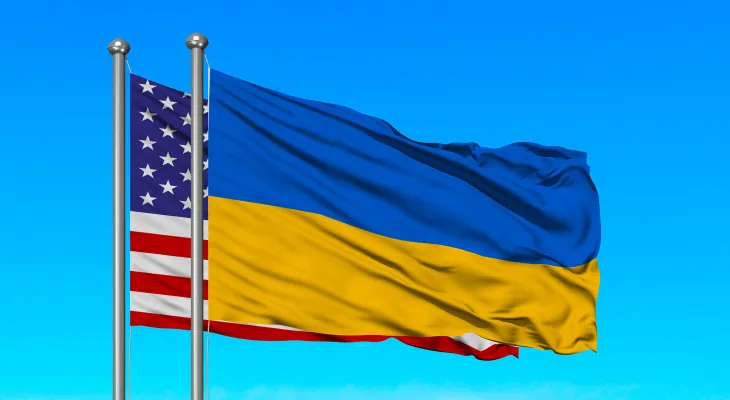Search here
Newspaper
Search here

Arab Canada News
News

Published: April 6, 2022
Washington (AP) - The United States today announced sanctions targeting the daughters of Russian President Vladimir Putin, and said it will tighten sanctions against Russian banks in response to "war crimes" in Ukraine.
The United Kingdom has strengthened asset freezes against two major banks, imposed a ban on British investment in Russia, and pledged to end dependence on Russian coal and oil by the end of the year.
The European Union is also expected to soon take additional steps, including a new ban on investment in Russia and a ban on coal, following recent evidence of atrocities that emerged after the withdrawal of Russian forces from the town of Bucha.
The United States took action against two of Russia's largest banks, Sberbank and Alfa Bank, banning the sale and purchase of assets through the U.S. financial system and prohibiting Americans from dealing with these two institutions.
In addition to sanctions targeting Putin's adult daughters, Maria Putina and Katerina Tikhonova, the U.S. targets Prime Minister Mikhail Mishustin; the wife and children of Russian Foreign Minister Sergey Lavrov; and members of the Russian Security Council, including Dmitry Medvedev, former president and prime minister.
The sanctions removed all of Putin's close family members from the U.S. financial system and froze any assets they have in the United States.
President Joe Biden said the latest round of sanctions would be "devastating."
Biden said in a tweet on Twitter: "I have made clear that Russia will pay a heavy and immediate price for its atrocities in Bucha."
Biden was expected to sign an executive order banning new investments in Russia by Americans regardless of their residence. The U.S. Treasury was preparing further sanctions against Russian state-owned companies, according to the White House.
In the same context, Britain announced asset freezes targeting Sberbank and the Moscow Credit Bank, and identified eight of the few Russians whom it says Putin "uses to support the war economy."
British Foreign Secretary Liz Truss said: "With our allies, we show the Russian elite that they cannot wash their hands of the atrocities committed on Putin’s orders."
Britain has already announced a plan to phase out Russian oil, which accounts for 8% of UK supplies. Russia is the largest supplier of imported coal to the UK, despite the decline in British demand for fuel over the past decade.
Britain has not stopped its imports of Russian natural gas, which accounts for 4% of its supplies, merely stating it will do so "as soon as possible."
Videos and images of bodies in the streets of Bucha after it was retaken from Russian forces sparked outrage among Western allies, who imposed new sanctions in response.
The ban proposed by the European Commission on coal imports will be the first EU sanction targeting Russia’s lucrative energy industry due to its war in Ukraine.
Josep Borrell, EU foreign policy chief, said energy is a key element in Russian President Vladimir Putin’s war coffers.
He added, "One billion euros is what we pay Putin daily for the energy he provides us since the beginning of the war. We have given him 35 billion euros. Compare that to the billion we have given Ukraine in weapons and arms."
Brian Deese, director of the White House National Economic Council, said "the steady tightening of sanctions is not a sign of their flaws as much as it is a sign of pressure on Russia as it seeks foreign investment and commodities." Deese said at an event sponsored by the Christian Science Monitor, "We need patience and a fine perspective when it comes to the impact on Russia of the unprecedented sanctions regime."
Deese pointed out that the Russian inflation rate is 2% weekly, which would worsen with an annual inflation rate above 200%. He noted that the Biden administration expects Russian prices not to rise by more than 200% this year.
While the White House said Russia should not attend the G20 meeting in Indonesia this November, it also indicated that it may withdraw from the organization anyway because its economy has weakened significantly.
After several European countries announced the expulsion of Russian diplomats, the European Commission proposed a fifth package of sanctions, including a ban on coal imports that can be adopted once the bloc’s 27 member state ambassadors unanimously approve it.
European Commission President Ursula von der Leyen said the coal ban amounts to 4 billion euros (4.4 billion dollars) annually and the European Union has already begun working on additional sanctions, including on oil imports.
Natural gas was not mentioned, with consensus among the EU’s 27 countries on targeting fuels used for electricity generation and home heating that are difficult to secure amid opposition from members dependent on gas such as Germany.
But European Council President Charles Michel said the bloc must continue to pressure the Kremlin, noting the need to impose a ban on gas imports at some point in the future.
The new package of measures proposed by the Commission also includes sanctions on more individuals and four major Russian banks, including VTB, Russia’s second-largest bank. The bloc will also ban Russian ships and ships operated by Russia from entering EU ports.
Further targeted export bans, worth 10 billion euros, are also proposed in sectors including computers, advanced semiconductors, sensitive machinery, and transport equipment.
Western allies have already cut several Russian banks off the SWIFT financial messaging system, which transfers billions of dollars daily among more than 11,000 banks and other financial institutions worldwide.
Comments